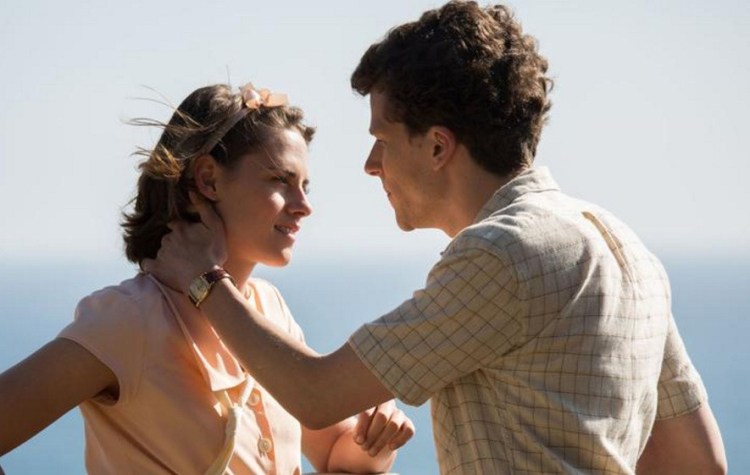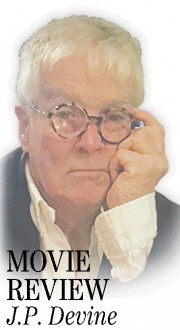“How sad and bad and mad it was — but then, how it was sweet.” — Robert Browning
It’s Woody time again, and here comes “Cafe Society,” just in time; with the temperatures up and boring conventions starting, Woody takes us on a trip back to old Hollywood.
And it’s all there: the summer linens, Gatsby’s silk shirts, Daisy’s summer dresses. Yes, Scott Fitzgerald was part of all this, and his boozy ghost floats among the partiers. Come on in; the sun is hot, and the gin is cold.
The Sunset Boulevard and Beverly Hills hotel cocktail lounge patios are perfect. Even today it’s the same, as though all life in Hollywood was a script written by God, and like David’s psalms, it must never be changed.
Thankfully, Woody Allen’s brilliant cinematographer Vittorio Storaro miraculously gets the light right, especially that orange evening glow in the sky over Malibu. It’s your grandma’s Hollywood of the 1930s, so wear something cool.
In “Cafe Society,” Woody gets right in color what James M. Cain, Nathanael West and Raymond Chandler got right in black and white type: dames and dark nights, mobsters and moonlight.
Briefly: Young Bobby Dorman (a Woody-ish Jesse Eisenberg), leaves his middle-class Jewish Brooklyn brownstoned family and goes to visit his rich Uncle Phil (Steve Carell) in Hollywood. Carell plays a powerful agent, drawn from any old 30’s movie. He’s a slick, successful philander who represents stars from Ginger Rogers to William Powell.
Sitting in amber afternoon light, Phil is startled by a nephew he doesn’t remember, but promises to find something for him, and then he does. Enter assistant Vonnie (a soft, breezy and different kind of Kristen Stewart), who takes Phil’s calls each day and his illicit kisses at night.
Vonnie becomes Bobby’s tour guide to tinsel town, showing off stars’ homes.
Of course, Bobby falls in love and she, unhappy with the broken promises of her big shot lover, sort of falls for him, but not for long.
After a succession of maybe she wills, maybe she won’ts, it’s over. Of course, love is never over, it just stops at an interesting place, with tears or sighs of relief.
Bobby, older and not much wiser, goes back to Manhattan and takes a job running a nightclub controlled by his gangster uncle, played by the always wonderful Corey Stoll. Oh, but it doesn’t end there. As William Faulkner told us, “The past is never dead. It’s not even past.”
A chunk of time, colored in pastel light, smelling of orange blossom perfume, passes slowly, as couples change partners, gangsters abound, and midnight cement burials flourish.
More important critics will tell you how it ends, but I won’t. It’s not a great Woody picture, but it’s great fun, full of light summer love and danger.
We thank him for the right details, especially those great shots of Manhattan, accompanied by an endless blue river of the greatest music the world has ever known, Rodgers and Hart, Gershwin, Cole Porter. (What happened to Fud Livingston’s “I’m Through With Love”?)
Eisenberg has thankfully acquired some energy. Stoll, as mobster uncle, is a chameleon and can do anything, even Ernest Hemingway in Woody’s “Midnight in Paris.” But Parker Posey is lost in a straight part. Posey should never do straight parts. Everyone else is perfect, especially the magnificent Jeannie Berlin, who was so brilliant in 1972’s “The Heartbreak Kid.” Here, all these years later, the gifted daughter of the comedy improvisation start Elaine May plays Eisenberg’s mother.
And thank you, Woody, for giving an old friend of yours and mine, John Doumanian, a bit as a bartender.
I was happy to see that Storaro’s camera captures that patina of sadness that floated like smog over the joys of old Hollywood.
Santo Loquasto’s production designs are, as usual, perfect — all spectator shoed, linen-suited and pastel perfect.
Suzy Benzinger’s costumes of the time capture the era. It’s as if she were channeling Orson Welles’ costume designer, Edward Stevenson from “Citizen Kane.” They’re that perfect. Woody owes her more money.
If you’re bored with politics and summer’s heat, join the party around Woody’s pool. The bar is open. Gin Rickey, anyone?
“Cafe Society” is return in Woody’s narrative style, to his great, and much better, 1987 “Radio Days,” with better written characters flowing in and out: The philandering radio host who got locked out on a roof top with the cigarette girl (a truly wonderful Mia Farrow) and where on New Year’s Eve, the perfect Wallace Shawn intones the saddest line of all.
Send questions/comments to the editors.




Success. Please wait for the page to reload. If the page does not reload within 5 seconds, please refresh the page.
Enter your email and password to access comments.
Hi, to comment on stories you must . This profile is in addition to your subscription and website login.
Already have a commenting profile? .
Invalid username/password.
Please check your email to confirm and complete your registration.
Only subscribers are eligible to post comments. Please subscribe or login first for digital access. Here’s why.
Use the form below to reset your password. When you've submitted your account email, we will send an email with a reset code.